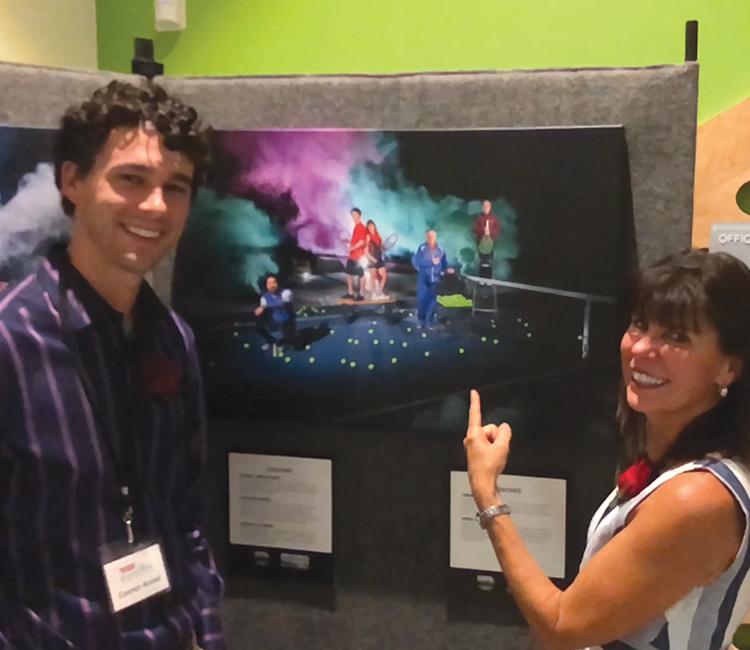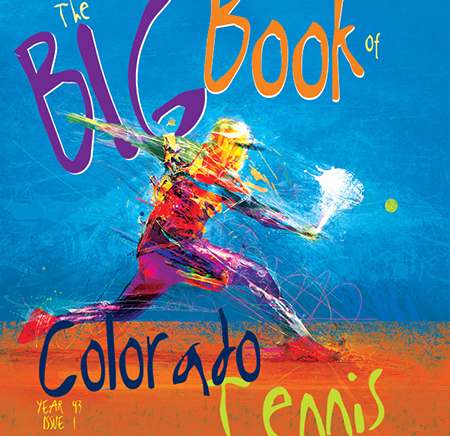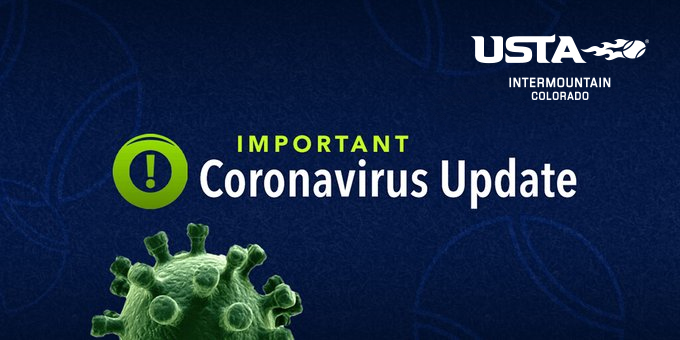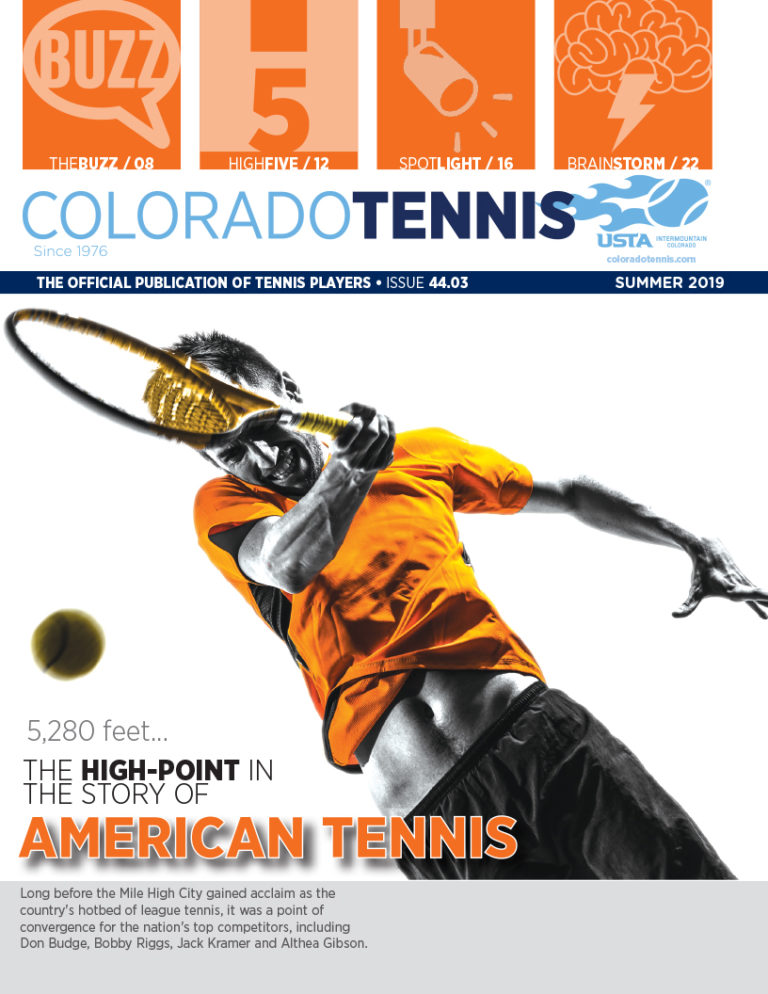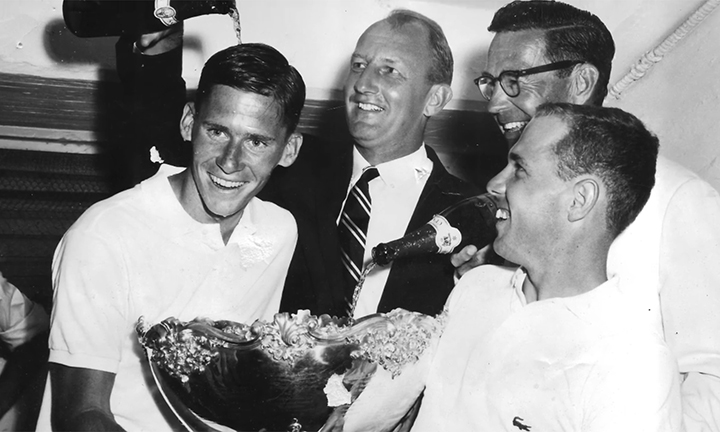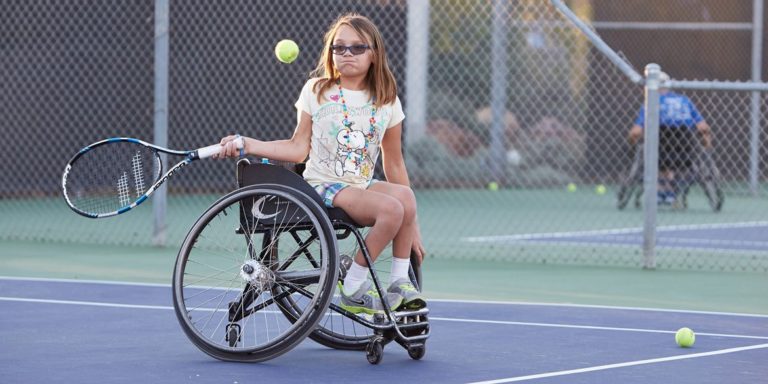Living to Serve
Connor Arend has generously volunteered his time for years, changing lives along the way. Last fall, he volunteered more than his time, and saved a life in the process.
Summer 2020 / Colorado Tennis magazine / Tom Fasano
Connor Arend’s footprint in his volunteer role for Special Olympics Colorado tennis was a small one at first.
The kid was only 8, so expectations were not that high for the second-grader.
However, over the last 15 years, Connor, who just turned 25 in August, changed that small footprint into a giant step forward by making a significant impact as a volunteer tennis coach for the special athletes in the program. The athletes’ love for Connor was on display when eight of them attended his wedding reception last year.
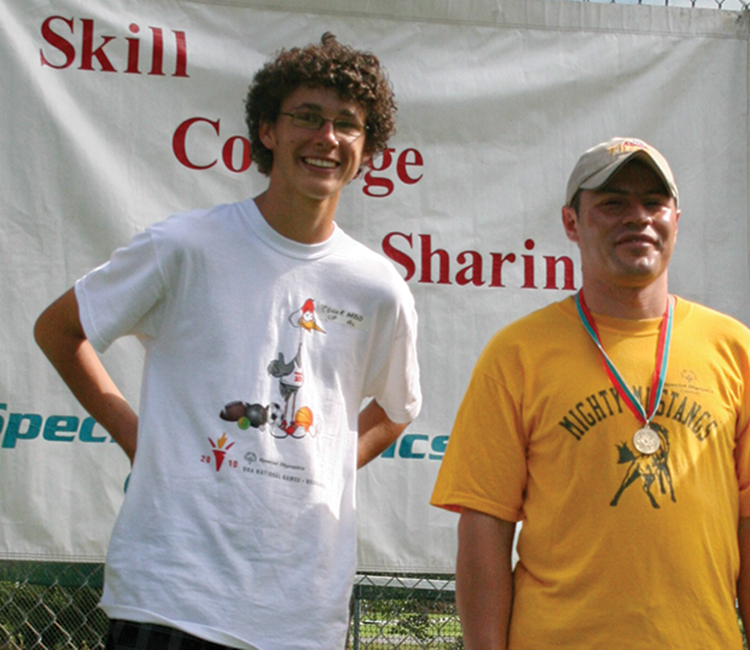
“They’re just as close of friends as any of my other friends,” says Connor, who also recalls the athletes attending his high school graduation party. “At our wedding, it was cool to have a mix of special athletes, people I played tennis with at Gonzaga, people I played tennis with in high school, people I grew up playing tennis with. Some of the best pictures from the wedding are the ones of the special athletes front and center because they’re so expressive. One of them has the biggest smile on his face from seeing us. They really are amazing friends. They’re some of the nicest and kindest friends anyone can have.”
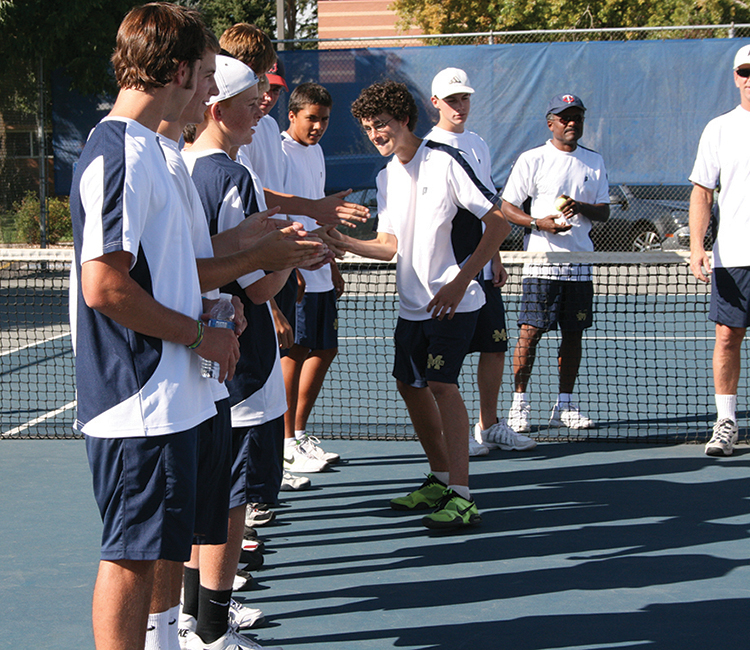
Connor was a former Team Colorado tennis player and No. 1 singles standout for Mullen High School. He was a four-time state qualifier who made it to the Class 4A state semifinals his senior year. He played for two years at Gonzaga University and is still very much involved every summer as a volunteer coach for Special Olympics.
BIG GIFT IN LIFE
“It’s always something that I would look forward to,” Connor says. “All the special athletes are always so nice and joyful, and that joy is contagious. Once you start getting to know the athletes and get to know their families, you just make friendships out of it going to Special Olympics. It’s been a very big gift in my life.”
Connor can thank his mom, Michelle Arend, for getting him started as a volunteer at such a young age. In addition, Michelle thanks the late Vicky Matarazzo, longtime legendary Special Olympics tennis director, for putting the volunteer bug in her ear.
“We played against each other in league play and then one day she just said, ‘You know what? I think you need to volunteer. And if you have kids, they should volunteer. And that was over 15 years ago and we’ve been doing it ever since,” says Michelle.
Michelle, whose daughter, Catherine, has also volunteered with her and Connor for Special Olympics, recalls how Connor started out.
“Mainly, what Connor did at that time and what we do with all of our really young volunteers is we just have them start picking up the balls and getting to know the names of the athletes,” says Michelle. “When he was old enough, he was hitting with the athletes. Because he also took lessons himself, I think it was kind of easy and natural for him to work with the athletes. At about 12 or 13, he became a unified partner. Then, around 14, a unified partner and a coach. And then the last few years besides being on the court, he’d run area games.”
FROM TENNIS PLAYER TO ROCKET SCIENTIST
Connor earned a perfect 4.32 grade-point average at Mullen and 3.87 GPA at Gonzaga. He majored in mechanical engineering at Gonzaga and is a rocket scientist along with Michelle and his dad Greg. Michelle says that Connor joined the family rocket launch business at United Launch Alliance in Centennial.
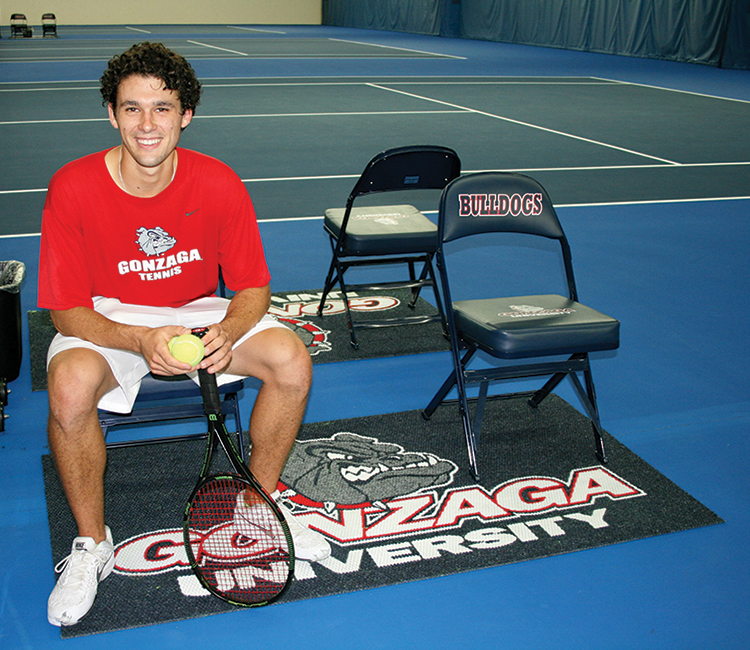
Connor says that tennis has given him an amazing avenue to serve others.
“Growing up playing tennis, I don’t think I ever would have thought that it would have led me to Special Olympics,” Connor says. “I would never have guessed that would be how I serve the community, but it really turned out to be one of the best ways I found to help out and give back to the community through tennis. It’s something I know and something I love and that I can share that with other athletes who have the desire to grow and become better tennis players. It just meshes really well with everything that I want to help people with. The sport of tennis, in general, has helped form me. From when I was very young, I knew that I loved tennis.”
Connor’s first tennis coach, Chris Stevens, who also volunteers for Special Olympics, remembers how Connor stood out from the time he started coaching him at the age of 4.
“I taught Connor at Ken Caryl from when he was a little boy to his early teen years,” Stevens says. “He was always someone I looked forward to teaching, as he was atypical of most boys that age. He always listened, had a great energy, and put forth the effort each week out on the court.”
The last couple of years, Connor and Stevens have “tag teamed” the Special Olympics regional and state tournament director roles.
“Similar to when he was a young player, his integrity is second to none,” notes Stevens. “He has always been reliable and energetic with all the athletes.”
SPORTSMANSHIP MATTERS MOST
Michelle says Connor learned from early on that while winning is important, it’s not everything.
“What’s everything is how you conduct yourself on the tennis court,” Michelle says. “Sportsmanship and how you conduct yourself, whether you win or lose, it matters most because that’s what people remember about you. From a very early age, we kind of said, ‘You’ve got to call those lines clean. You’ve got to go to practice. You respect your coach. Everybody who is there to help you, you need to show grace and gratitude because they could be someplace else instead of on this tennis court with you.”
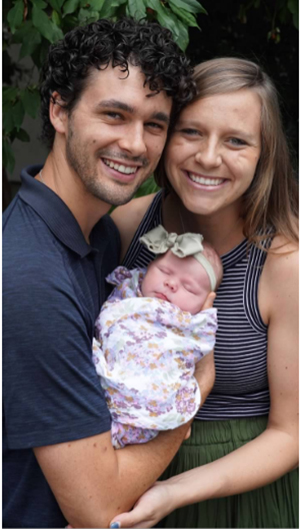
It’s been quite the year for Connor, who recently became a proud dad along with his newlywed wife, Maddie. He married Maddie in October 2019. He donated a kidney a month later in November. He and Maddie bought a house in March 2020. And their daughter, Gemma Jean, was born on July 15.
The aforementioned events make up the circle of life, but the kidney donation puts Connor on another level. Connor donated his kidney to John Bickham, the husband of Connor’s high school theology teacher, Rita Niblack.
It’s very humbling because my life doesn’t feel like it’s been affected. It seemed like the easy thing to do because it really only affected me during the surgery and during the recovery,” Connor says. “Now I live the same life I did before the surgery. I saw (John) a month or two ago and he looks amazing. He probably looks 10 or 20 years younger. He is doing amazing.”
FAITH IS THE FOUNDATION
A strong Catholic faith plays a large part in the Arend family.
“How often do we have the opportunity to save a life and are willing to do it?” Michelle says. “I couldn’t be more proud of the decisions that he makes. He has truly a heart to serve others.
“Faith is definitely the foundation and probably the driving method of do for others,” Michelle continues. “Every day you should think, ‘What can I do for others?’ And I think it just really puts you in a place of grace and gratitude for everything then that happens in your life, you’re like, ‘This is OK.’ The same with our athletes. They’re so wonderful and they face so many challenges that we’ll never even have to face. And yet, they come out with their tennis rackets, they’re ready to go. Even if you’re not having the best day, after you spend 90 minutes with them on the tennis court it’s all better.”
Maddie says that Connor is a unique and one-of-a-kind guy.
“I think that when your faith and your plans are grounded in something greater than yourself, it restores a lot of hope and everything is going to turn out the way that it’s supposed to,” Maddie says. “When you’re giving of yourself in the way that Connor has in a lot of ways, it’s very grounding. We’re grateful for our faith and super glad that we can sort of live it out in a lot of ways that some people can’t.”
SPECIAL INTERACTION WITH ATHLETES
Maddie says it’s special to see Connor interact with the special athletes.
“When you see them wanting to be involved in our lives outside of Special Olympics, I think that really goes to show the impact that Connor’s made in their lives and in their families’ lives as a whole,” says Maddie, who also helps volunteer with Connor. “It’s amazing to see what we get from the athletes. It’s something that he loves doing, and we enjoy doing as a family.”
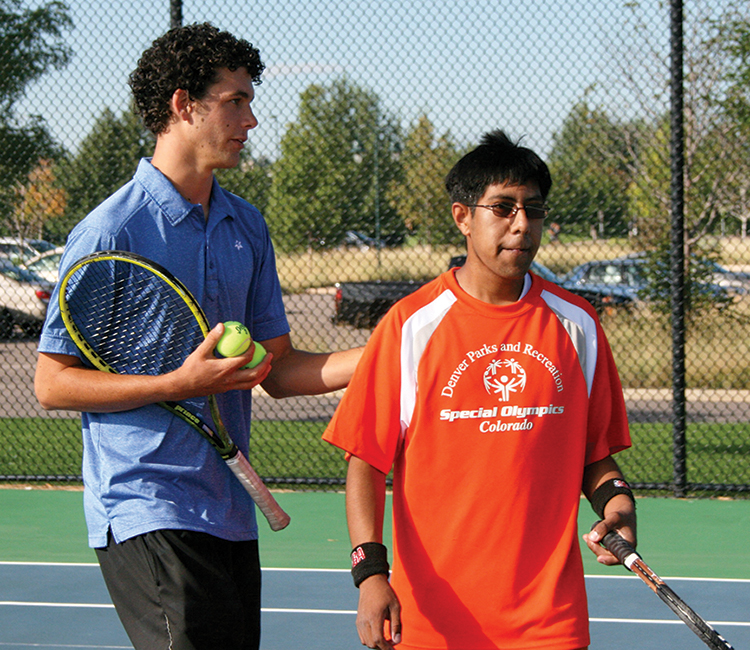
Connor says there are athletes who have been participating in Special Olympics tennis the entire 15 years he’s been a volunteer.
“Some started coming when they were 10 or 12 and now they’re in their 20s. To see their improvement throughout those years is amazing,” Connor said. “There were some when they started out were having trouble hitting the ball. Now, five or 10 years later, they’re having longer rallies. They’re moving up from skills competition to actual point play and match play. It’s so rewarding to see their improvement over the years. Knowing that we played some part in that is really awesome.” CT
